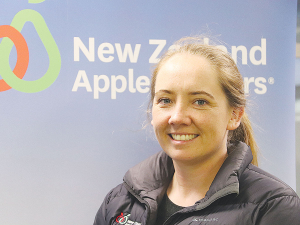New Zealand apple and pear harvest 2026 signals standout season
Early forecasts for New Zealand's apples and pears point to a standout season marked by exceptional fruit quality and high pack-out rates.
 NZ Apples and Pears market access manager Danielle Adsett says apple trees that have survived the cyclone are blooming and looking good at this stage.
NZ Apples and Pears market access manager Danielle Adsett says apple trees that have survived the cyclone are blooming and looking good at this stage.
"It's not the nightmare it could have been!”
That’s the message from NZ Apples and Pears market access manager Danielle Adsett to the news that more apple trees in Hawke’s Bay have recovered from the devastating effects of Cyclone Gabrielle and other adverse weather.
Adsett says it’s been a very kind spring this season and the trees that have survived the cyclone are blooming and is looking good at this stage. She told Rural News that this season looks more like a normal season and conditions for pollination have been very good and they are quietly positive of having a fairly good crop.
“But there are two sides to the story. There are lot of growers who have been affected that have orchards that are still standing and they are quietly optimistic about the crop that is appearing on the trees,” Adsett says. “But then there is the other side of the story, which is the amount of financial strain they are under and that is largely because they couldn’t harvest a crop last year, so while they are quietly positive, they are still under considerable financial strain.”
Adsett says for those growers who have lost all or large chunks of their orchards, it is a nightmare. In some cases, the orchards will not be replanted and for others, recovery could take up to five years or more before they get a commercial crop.
“Looking at Hawke’s Bay and Tairawhiti, we had about 2000ha of apples that that we thought were at risk. A lot of trees on that land have lived – so from an industry point of view it’s not the nightmare it could have been,” Adsett explains.
“But in saying that, I want to acknowledge the tough times growers who have lost their orchards are going through.”
Meanwhile, Adsett warns that while good budburst is a positive sign, it’s possible that some trees will die in the coming or subsequent years.
She says it’s possible that some blocks are on life support and the effects of the cyclone are still far from over.
Adsett told Rural News that those orchardists who sprayed a plant stimulant, phosacid, on their trees just after the cyclone have reported a better survival rate of their trees. However, those trees on land which is poorly drained appear not to have benefited much from this.
“Talking to growers, they say every block is different and in some cases individual rows are different,” Adsett adds. “Right now, growers – more than ever – are acutely aware of what is happening on their orchard and responding accordingly.”
In recent weeks, Hawke’s Bay and Tairawhiti have experienced more heavy rain. However, Adsett says while this may have caused some problems around Gisborne, in Hawke’s Bay the rain is seen as timely. She says it will increase the soil moisture levels in many orchards ahead of what many people are predicting to be a dry summer.
Nervous Wait for January
The real judgement day for the Hawke’s Bay apple crop comes in January when NZ Apples and Pears reveals their crop estimate for the season.
“By mid-January we will know exactly what’s on the trees and how the season is shaping up in terms of the quality of that fruit and what the forecast for harvest will be. That will tell us how the trees have managed to set fruit and hold the crop.”
Adsett says knowing the size of the crop will also give an indication to growers and packhouse owners of what their labour needs will be.
With the knowledge of the crop size, attention will then focus on marketing the crop. While this is done by private companies, Adsett says the outlook for NZ is positive. She notes that both China and the USA have large apple crops this season but they tend to focus on the commodity market, whereas NZ targets the premium end of the markets.
“So as long as our quality is good, which we hope it will be, there will always be a place for NZ apples in the international market.”
Voting has started for the renewal of DairyNZ's milksolids levy.
The most successful catchment groups in NZ are those that have 'a source to sea' approach.
Associate Agriculture Minister and Manawatu dairy farmer Andrew Hoggard says the free trade agreement (FTA) negotiated with India is not a bad deal and his party, Act, will support it when it goes before Parliament.
Newly released data from Environment Canterbury (ECan) Farm Environment Plan (FEP) audits are showing a dramatic lift in environmental performance across the region.
A solid recovery of global dairy prices this year makes a $9.50/kgMS milk price almost a shoo-in for this season.
As New Zealand marks the United Nations’ International Year of the Woman Farmer 2026 (IYWF 2026), industry leaders are challenging the misconception that women only support farming.

OPINION: Here w go: the election date is set for November 7 and the politicians are out of the gate…
OPINION: ECan data was released a few days ago showing Canterbury farmers have made “giant strides on environmental performance”.